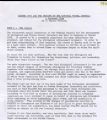Timeline
1970
National Tribal Council established
A split arising from growing frustration at white control of the multi-racial organisations such as the Victorian Aborigines Advancement League and the Federal Council for the Advancement of Aborigines and Torres Strait Islanders (FCAATSI) comes to a head at the 1970 FCAATSI Easter conference. While the motions for Indigenous control of the Federal Council are not successful, the national movement is split with the formation of the National Tribal Council.
Easter 1970 and the origins of the National Tribal Council: a personal view
Courtesy Barrie Pittock
Download Easter 1970 and the origins of the National Tribal Council: a personal view [PDF 3277kb]
Captain Cook Bi-Centenary protest
While non-Indigenous Australians celebrate, Aboriginal Australians organise an alternative remembrance at La Perouse Aboriginal Reserve at Botany Bay. In Melbourne a car sticker campaign - 'Cook is bad news for Aborigines' - makes the same point.
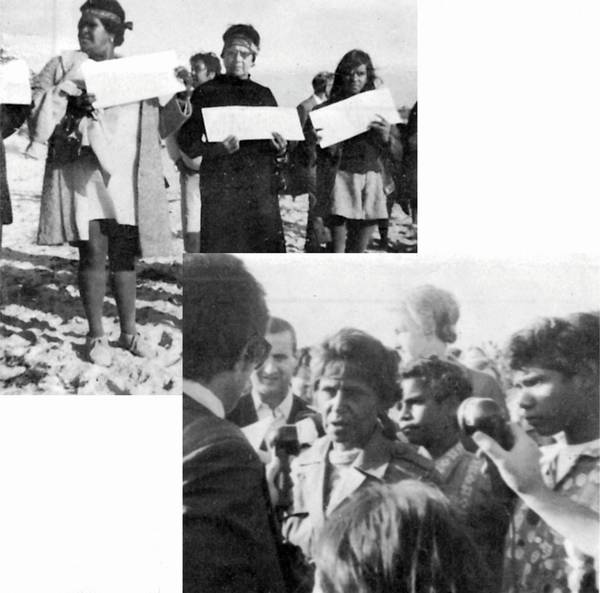
(Top) Eleanor Harding, Geraldine Briggs and Margaret Jones protesting at La Perouse. (Bottom) Kath Walker faces the press at La Perouse.
Source: Aborigines Advancement League (Victoria) Newsletter, June 1970
Legal and medical services
Aboriginal Legal and Medical Services are set up in Sydney. These services, the first of many, are supported by federal government grants.
Victorian land rights won
Passage of the Aboriginal Lands Act in Victoria leads to the presentation of the title deeds to residents of Lake Tyers and Framlingham in July.
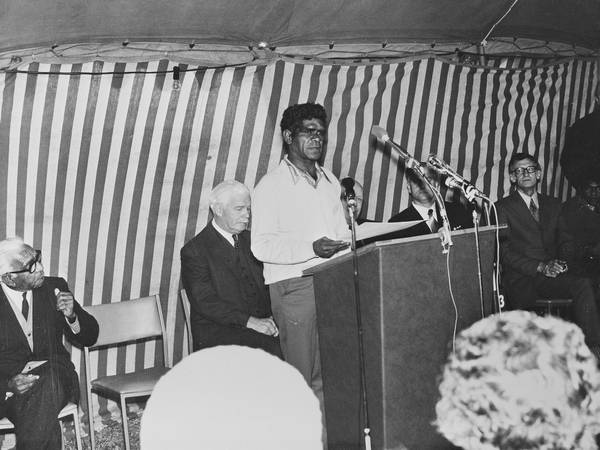
Charlie Carter receives the title deed to Lake Tyers on behalf of residents. Rohan Delacombe, Governor of Victoria, is to his right. Pastor Doug Nicholls, far left, looks on.
Source: Audio Visual Archive, Australian Institute of Aboriginal and Torres Strait Islander Studies, Canberra
International: Bantus forced to move
In South Africa, the Bantu Homelands Citizenship Act forces more than three million people to resettle in one of ten 'Bantu Homelands'.
International: Maori militants
In New Zealand, Maori activist group Nga Tamatoa (The Young Warriors) is formed.
1971
Yirrkala people lose case
Mr Justice Blackburn rules against the Yirrkala people in their case against Nabalco and the Commonwealth of Australia. The Yolngu people are shocked and angered at this outcome.
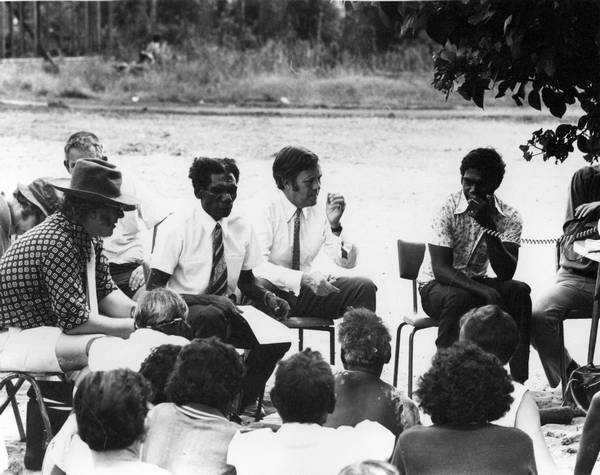
This photo was taken at Yirrkala. It is not dated but would most likely have been taken in 1971.
Source: PH0416/0082, ABC TV Collection, Northern Territory Library and Information Service, Davwin
Aborigines Advancement League
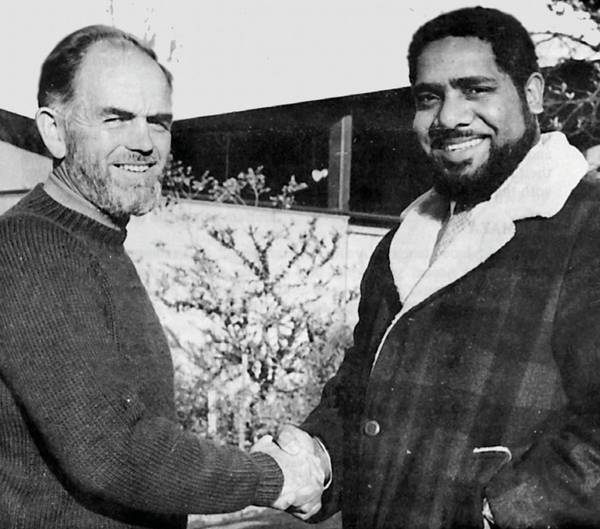
Stan Davey was the former General Secretary of the Victorian Aborigines Advancement League. By 1970 the Aborigines Advancement League had a predominantly Aboriginal executive.
Source: Aborigines Advancement League Newsletter, July 1970
1972
International: Broken treaties
The Trail of Broken Treaties, a protest organised by the American Indian Movement and other First Nations groups, sees over 800 people travel across the United States to Washington.
The Aboriginal Tent Embassy
Aboriginal activists outraged by Prime Minister William McMahon's refusal to acknowledge an Indigenous right to land set up their beach umbrella and hang from it a sign 'Aboriginal Embassy'. The protest grows. Footage shown of confrontations with police pulling down the tents swells the numbers of supporters, bringing together urban activists and people from remote communities in the Northern Territory.
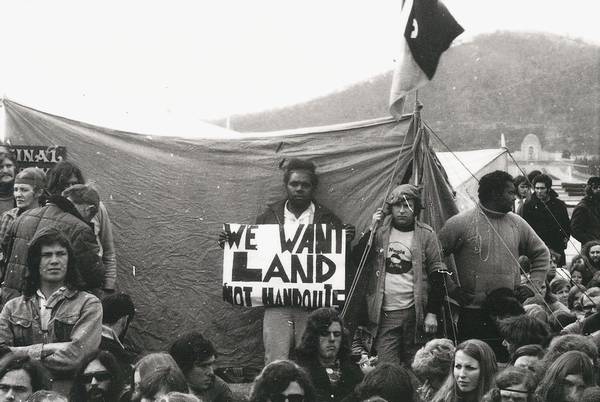
Alan Sharpley with placard, Bob Perry in a Ningla-a-Na T-shirt and John Newfong with hands on hips at the Aboriginal Tent Embassy in Canberra. The Pitjantjatjara expression Ningla-a-Na is translated as 'we are hungry for our land'.
Source: Ken Middleton collection, National Library of Australia
1973
International: Canadian native title
In Canada, the Supreme Court recognises that Nisga'a Indians held native title to their lands before the creation of British Columbia.
International: Wounded Knee
At the Pine Ridge Reservation in South Dakota, about 200 supporters of the American Indian Movement reclaim the village of Wounded Knee and announce the creation of the Oglala Sioux Nation. United States armed forces surround the group in a siege that lasts 71 days.
NACC is established
The National Aboriginal Consultative Committee is set up as a move towards Aboriginal representation. People over 18 who class themselves as Aboriginal, and are recognised as such by their community, are eligible to vote. Its role is only advisory.
Aboriginal Land Rights Commission established
The Aboriginal Land Rights Commission, headed by Justice Woodward, is set up by the government of Gough Whitlam to establish ways for Aborigines to get land rights in the Northern Territory. As a result of its recommendations the Northern Land and the Central Land Councils are set up.
1974
International: Treaty of Waitangi celebrated
In New Zealand, Waitangi Day becomes a national holiday after three years of campaigning by Nga Tamatoa, a militant Maori organisation.
1975
Land returned to Gurindji
Prime Minister Gough Whitlam returns land to the Gurindji people. More than a decade after the walk-off from Wave Hill station 3300 square kilometres of land are returned to traditional owners.
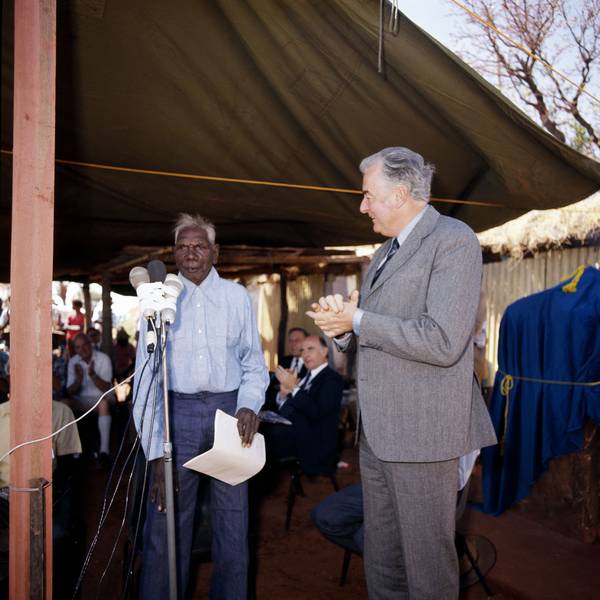
At a ceremony on 16 August 1975 Prime Minister Gough Whitlam handed title to land at Wattie Creek to Vincent Lingiari, spokesman for the Gurindji people.
Source: A8598, AK6/5/80/15, National Archives of Australia, Canberra
1976
International: Police violence in Soweto
In Soweto, South Africa, a group of school students meet to protest mandatory instruction in Afrikaans. Police respond with tear gas and by firing on the crowd. By the end of the day, 23 people have been shot (according to official figures), the massacre sparking continuing violence over the next eight months. This results in a further 575 protestors being killed, including Black Consciousness activist Steve Biko.
Land rights act passed
The Aboriginal Land Rights (Northern Territory) Act is the first national land rights legislation. Initially prepared by the Whitlam Labor government, it is passed with minor modifications by the Fraser Liberal/National Party government.
The Act recognises 'traditional Aboriginal owners' for the first time in Australian law and it provides for 'the granting of Traditional Aboriginal Land in the Northern Territory for the benefit of Aboriginals, and for other purposes'. Although the Act has been amended more than 15 times since 1976 it remains substantially the same as passed in 1976.
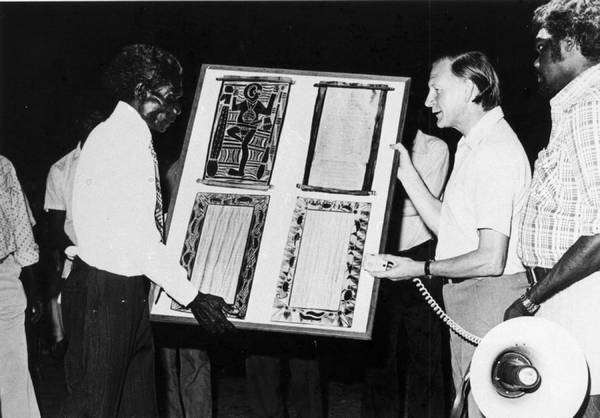
The Minister for Aboriginal Affairs, Hon. Ian Viner, presented the land title to Roy Marika in 1978.
Source: Northern Territory Library and Information Service
International: Independence from Australia
The Australian Trust Territory of New Guinea unites with the Non-Self-Governing Territory of Papua (also administered by Australia) to form the new independent Pacific nation of Papua New Guinea.
International: Maori protest
In New Zealand, Whina Cooper leads a land march from the top of the North Island to the Parliament buildings in Wellington, protesting the continuing alienation of Maori land.
1977
Federal consultation
The National Aboriginal Consultative Committee is replaced by the National Aboriginal Conference. Its role is also only advisory.
International: Maoris struggle for land rights
In New Zealand, the Waitangi Tribunal is established as a formal commission of enquiry to hear treaty grievances against the Crown.
At Bastion Point in Auckland, protestors stage a land rights occupation after the government announces a housing development on Ngati Whatua reserve land. The demonstration lasts for 506 days before the protestors are evicted by police.
1978
Yolngu people receive land title
Under the Aboriginal Land Rights (Northern Territory) Act, the Yolngu people finally receive the title to their land, fifteen years after they delivered their bark petition to the Commonwealth government and years after mines and the infrastructure to support mining has been established on their doorstep.
396225
- 396138
- 396162
- 396177
- 396192
- 396225
- 794551
